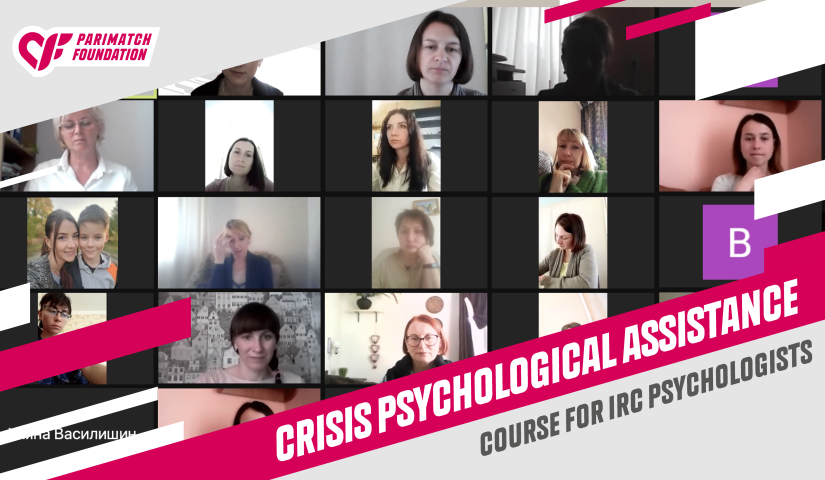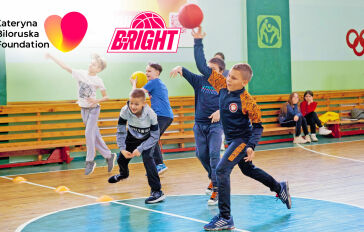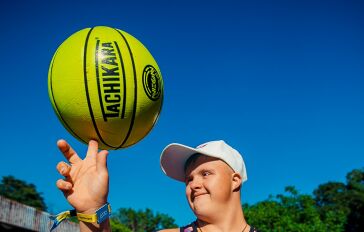
At the initiative of the International Charitable organization Parimatch Foundation, together with the Israeli Trauma Coalition, is launching a training course for psychologists specializing in «Psychological Support in Crisis.»
The project aims to share with Ukrainian psychologists the latest techniques of crisis assistance that are needed when working with internally displaced persons of different ages during the war.
«Experts of the Israeli Trauma Coalition developed psychological Support in Crisis» course. One of the course lecturers is Denys Denysenko — a psychologist, master of health care management, and certified Gestalt therapist who helps organize humanitarian aid to the population in crisis.
– A six-day training course for psychologists about crisis psychological care has been completed recently. Based on the experience of the Israeli Trauma Coalition during several wars, constant rocket fire, and terrorist attacks, a short course, «How to provide psychological assistance in a crisis,» was developed.
Such knowledge is more relevant now than ever. The situation in our country, constant shelling, significant changes in living conditions, loss of loved ones, etc., cause different normal reactions for people in abnormal conditions. Approximate statistics say that 20% of the civilians may have post-traumatic stress disorder if they do not work with these reactions over time, – Denis Denysenko says.
– Now, there is an information and physically dangerous space around us. It provokes an instinctual caution. So when we started our training, the participants were not very active, but after 2-3 classes, they began to trust each other and the coach, and we moved forward.
The practices given in this course can significantly reduce stress levels and train so-called expert responses to stress. It is impossible to eradicate stress reactions. They are natural and even protect us from various threats. But it is essential to train the personal responses and know how to regain control of your body first and then your thoughts and emotions.
It is the first pilot project initiated together with the Parimatch Foundation. Practical work will allow us to monitor how effectively our participants can apply methods and protocols for providing psychological assistance to displaced persons in shelters. Vaccination can compare this training, but we strengthen a person’s immunity to stress resistance and strengthen mental health. Therefore, the more people in Ukraine are trained, the stronger the mental immunity of Ukrainians will be. They have to resist the enemy trying to break our freedom, body, and spirit.
Since the beginning of the war, the Ternopil region has become one of the key hubs for internally displaced persons. Therefore, this region became the first to complete the course «Psychological Support in Crisis.» After the training, specialists will be able to work with children and adults in IRC centers.
– First, I would like to thank the organizers and coaches! This course exceeded my expectations! I’ve got the most interesting, valuable knowledge and practical skills. The information was given so clearly, structured, and at the same time quickly that I wanted to hold it. Due to this, I have formed the correct algorithm for working in acute stress response and crises. Thank you! I knew some techniques and used them. But most of the information, especially work protocols, was something new to me. Now I am inspired to use this knowledge and practical skills in my work – she shared her impressions of studying Julia Skaliy, Psychologist of the municipal institution IRC of Kremenets City Council.
– In fact, I dreamt of learning about the War Trauma in collaboration with Israeli experts. I am sure that Israeli specialists have the most practically acquired knowledge close to the military realities. So I was a little bit scared that I couldn’t cope with this professional theoretical course. However, it turned out to be one of the most enjoyable learning in my practice. First, I want to note that the entire trail is practically orientated. There is no unnecessary theory and definitions. It is easy for everyone to understand the principle of providing primary care. The system has a logical structure, full of clear and straightforward techniques based, as a rule, on the theoretical knowledge previously obtained by psychologists. You start implementing these techniques in the daily work of the IRC, even unintentionally. I would like to mention the work of coaches. Mr. Denys managed to organize the work so that it was not taken as training, and it was more like working with an experienced friend, a counselor. It was more about intervention and support than just training. It was easy, willing, and simple to operate, – said Natalia Kulchytska-Ruchka, a psychologist at the IRC of Brzezany City Council.
Halyna Harmatiy, a psychologist at the Ternopil City Council’s IRC I1, had similar feelings after the course:
– This is my first experience. Denys was so easy to perceive; I wanted to listen to him. In addition, I managed to work on myself, to analyze my actions and thoughts. Because I experienced challenging life situations even before the war. My husband and mother died in an accident; I was left with three children and a granddaughter. I was constantly worried about the children so that they could bear this loss more quickly. But it is challenging to help children when I do not allow myself to survive this loss. Therefore, the courses like this give you the awareness of how to deal with such critical conditions. It remains to start practicing.
It is to be recalled the training course was initiated as part of the Parimatch Foundation’s psychological rehabilitation strategic program for children and adults affected by the war. The Foundation aims to train as many IRC professionals as possible in the regions with the highest number of internally displaced persons.






